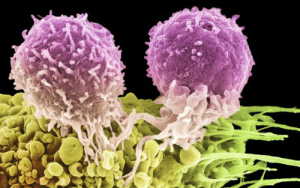Study: Genetic Mutations Found in 8.5% of Children with Cancer
In recent years, our understanding of childhood cancer has become more and more profound, and the challenge that doctors are now faced with is how to better use the knowledge to provide treatment and guidance to patients. As more and more children survive in cancer, such medical instruction should last a lifetime.
Why do children get cancer? Scientists have always thought the genes as the key to this issue. A recent study published at the top medical journal New England Journal of Medicine shows that cancer susceptibility genes in children with cancer is more common than people generally think. According to the new study, about 8.5% of children with cancer were found to have mutations in cancer-predisposing genes, though most of those children did not have a family history of the disease.
[caption id="attachment_335" align="alignright" width="300"] Genetic Mutations[/caption]
Genetic Mutations[/caption]
Researchers at St. Jude Children's Research Hospital analyzed 1,120 pediatric cancer patients samples and found that 8.5 percent of children had pathogenic or likely pathogenic mutations of genes within their normal tissue that increase their risk of developing cancer. This proportion was considered at 5% in the past.
Surprisingly, researchers also found that these patients carried a lot of adult cancer genes, such as breast cancer and ovarian cancer. These genes are the main drivers of adult cancers, but it seems that nothing is associated with childhood cancer. It is still not clear whether they are causes of childhood cancers, but the researchers speculate that they should play a role in childhood cancers.
This study revealed that more than half of the children with germline mutations lacked any family history of cancer. In most cases, the child inherited cancer susceptibility mutation does not seem to harm their families. This may be because some mutations were spontaneously formed during an individual development. Another possibility is that there has been lack of relevant information, as pediatric oncologist often do not ask about family adult cancers. This situation should not be ignored, because the cancer genes we already know may also be associated with other cancers.
Many pediatric oncology doctors believe that in the future every child with cancer should be carried out the genome sequencing. The identification of children with cancer genes have many benefits, for example, if you find a specific DNA affecting the body's response to a drug, you can use other ways to treat.
This new study is regarded as the most detailed analysis yet of the role germline mutations in genes associated with cancer predisposition play in the development of childhood cancer. As the corresponding author James R. Downing, M.D., president and CEO of St. Jude Children’s Research Hospital, said in a news release: “This paper marks an important turning point in our understanding of pediatric cancer risk and will likely change how patients are evaluated." Considering some cancer mutations will lead childhood cancer survivors to suffering another cancer, doctors need to provide better guidance and advice to patients and their families.
Journal Reference:
Zhang et al. Germline Mutations in Predisposition Genes in Pediatric Cancer. New England Journal of Medicine., Nov. 18, 2015 DOI: 10.1056/NEJMoa1508054

Your email address will not be published. Required fields are marked *